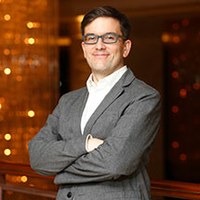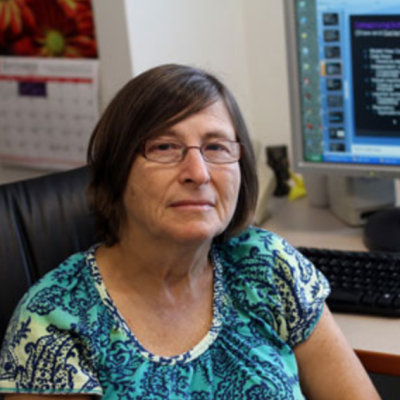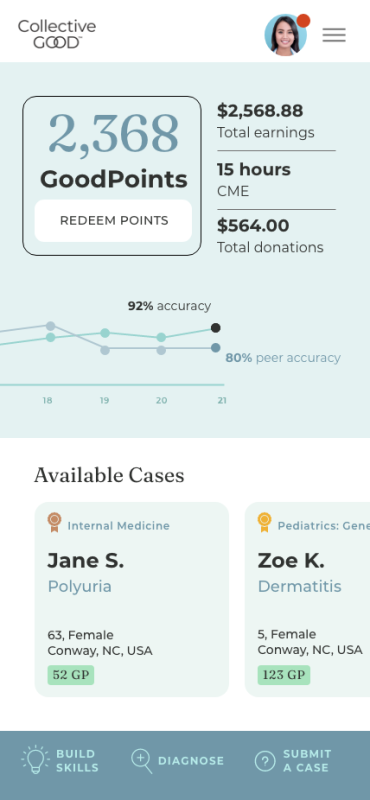Leveling up diagnostics for social good
January 26, 2023
The ability to make a diagnosis is an essential part of a health care provider’s toolset, developed through years of learning, practice and experience that can broaden knowledge and hone critical thinking.
In the formal health care sector, providers often grow their diagnostic skills through medical training, patient interactions, consults with colleagues and continuing education. But for those in rural areas or developing countries, these opportunities and resources for learning may be harder to come by.
Researchers at Carolina are developing a digitized way to make that training more accessible through a new app called “CollectiveGoodMD,” which aims to test and grow diagnostic skills through gamification and peer-sourced knowledge.

Dr. Sean Sylvia
“In places where the formal health care sector is resource constrained, people often go to informal providers, such as a pharmacist or a traditional healer, to get medical advice first,” said co-developer Sean Sylvia, PhD, who is assistant professor of health policy and management at the UNC Gillings School of Global Public Health. “So, the question we asked ourselves was, how can we build something that can improve access to basic knowledge on diagnostics? Because when an informal provider is well trained in recognizing when someone needs care, then they can make referrals or better prescribe.”

Dr. Joe Tucker

Dr. Diane Pozefsky
The new app is a collaboration between Sylvia, Professor Joseph Tucker, MD, PhD, at the UNC School of Medicine, and Professor Diane Pozefsky, PhD, in the Department of Computer Science, with support from First in Venture Studio, Innovate Carolina, the Eshelman Institute for Innovation and the Gillings School.
True to its name, the creators want the app to serve as a tool for the collective good in health care by providing access to diagnostic training for practitioners, residents, administrators and medical students. More broadly, they also want to give providers around the world a cost-effective way to consult with specialists and get second opinions from peers on real-world patient cases.

This is the home screen of the CollectiveGoodMD app. (Photo Credit: collectivegood.io)
When a user logs on to CollectiveGoodMD, they start by reviewing test cases similar to the clinical vignettes used in medical school. After analyzing sample patient demographics and symptoms, the user is graded based on the accuracy of their diagnosis. They can also choose between different medical specialties – like internal medicine, dermatology or pediatrics – which gives them the opportunity to hone their skills in new fields.
“Local patients who have already seen many health professionals about a medical problem will provide information [for the test cases] to help train users on diagnostic skills,” explained Tucker, who is a member of the Institute for Global Health & Infectious Diseases and co-director of UNC Project China. “From the perspective of the patient, this can help to enhance access to health professional opinions. From the perspective of health professionals, it provides a way to learn and increase diagnostic acumen.”
Tucker says the group will protect privacy by using de-identified information, including community oversight and being explicit about what information is gathered.
Sylvia likens the concept to Duolingo because it employs similar strategies to those used in the language learning app – as the user progresses, the cases increase in difficulty. The higher the accuracy of their cases, the more confidence and experience the user gains in the app as a diagnostician. Reaching tiered levels like bronze, silver and gold in varying medical specialties unlocks more cases and the opportunity for the user to start earning payment for their diagnostic expertise.
Users who have established enough credibility as a diagnostician to reach the bronze level are given access to review real-world cases submitted by other users looking for a consensus opinion. When reviewing each case, the user can submit a probable diagnosis with a percentage of confidence, which includes an explanation for their reasoning and other relevant information. These cases also show the consensus from others who have reviewed the case, including a probable diagnosis and confidence level, rationale, and time spent reviewing.
For each case reviewed, the user earns in-game currency called “good points,” which can increase based on the user’s tier in each medical specialty.
“We recognize that some doctors aren’t that interested in making money and would prefer to earn continuing medical education credits or do some social good to help other providers who don’t have access to colleagues,” Sylvia said. “And so, as they accrue these good points, they can cash them out for payment, they can earn CME credits, or they can donate them to a charity.”
The team is piloting the app with medical students and residents in several countries, including the United States, India and China. Many schools have expressed an interest in digital techniques to train new physicians, according to Sylvia, and the hope is that UNC may soon join the list of test participants.
Launching the app has been a group effort, with critical support from Anne Glauber, MPH, associate director of research and innovation at the Gillings School, and Bob Dieterle, managing director of the UNC Digital Health Venture Studio. With help from the venture studios at Carolina and mentorship from Gillings School innovators like Don Holzworth, MS, and Lee Phillips, MA, the team is currently working on a Small Business Technology Transfer grant through the National Science Foundation. They are also collaborating with fellow co-founder Charlie Aleman on business strategy.
“We want to scale this out in a way that can support our goals as a non-profit promoting social good,” Sylvia said, “and it’s been fun seeing this come to life.”
Learn more about Sylvia and Tucker’s Collective Good social enterprise and CollectiveGoodMD at collectivegood.io.
Contact the UNC Gillings School of Global Public Health communications team at sphcomm@unc.edu.
